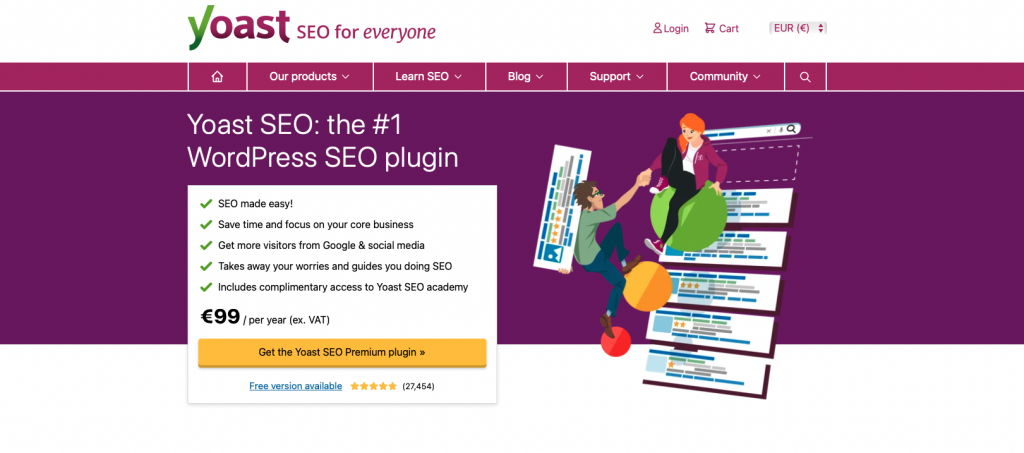Since most sites run on WordPress, using SEO plugins boost website traffic, letting you reach out to larger target audiences. At the same time, SEO plugins improve your website performance, security, and page loading speed. Additional elements that enhance your search engine rankings are the keywords you use, search intent, size of image files, content readability, and mobile-friendliness.
But, if you don’t have a WordPress SEO plugin in place, you’ll have to fight against the competition that uses high-end tools to boost their SERPs rankings. And considering that over 90% of web traffic is driven through search engines, optimizing your content for SEO can make the difference between conversions and bounce rate.
SEO plugins are amazing because they let you fix broken links, conduct an SEO audit, find which pages have the greatest potential, and re-organize your site’s structure to improve the UX experience.
What is WordPress?
WordPress is a CMS (content management system) and web publishing software for creating easy-to-use and flexible websites, including blogs and online stores. Since 2003, when it was released initially, WordPress has become the number one CRM. In fact, WordPress powers about 37% of the Web, which is impressive.
Thanks to WordPress, users can manage and build eCommerce websites, personal blogs, hobby blogs, or full-featured websites without code, using just a web browser, such as Google Chrome, Mozilla Firefox, Microsoft Edge, Brave, and Vivaldi, among others.
What is SEO?
Search engine optimization (SEO) optimizes a site’s content in such a way as to help it rank high in the search engines to boost traffic. SEO persuades search engines to recommend your pages to internet users.

But how does this happen?
Well, search engine bots crawl web pages, find the best of them, and then create an index. Once done, search engine algorithms review the index based on ranking factors to determine how they should rank the pages on the search engine results pages (SERPs) when web users search for a specific query.
SEO is also a process that needs to be constantly updated and improved. If you don’t keep content updated, gain relevant backlinks, and add new information to target specific keywords, it won’t rank. According to HubSpot, 75% of users don’t scroll beyond the first page of the search engines. So, SEO optimization is paramount because it lets you rank your pages on the first page of the SERPs, bringing organic (i.e., non-paid/free) traffic to your site.
However, there isn’t only one type of SEO. On the contrary, there are many types to choose from and implement in your long-term SEO strategy. Even though most SEO tools specialize in one or two areas, approaching SEO holistically is what makes the difference:
- Local SEO: It includes maintaining a Google My Business profile, managing reviews, and optimizing for voice search. The reason to do all of these is to gain a local presence as a business.
- On-Page and Off-Page SEO: On-page SEO includes title tags, meta descriptions, content, internal links, etc. Off-page SEO includes actions taken to increase the presence of your business outside of your main company site. Social media strategy, backlinks, and engaging in influencer marketing are forms of off-page SEO.
- Technical SEO: This includes indexation, crawling, website speed and architecture, structured markup, and ensures the website is easily accessible to search engines.
The Top 3 WordPress SEO Plugins for 2022
An SEO plugin helps you optimize tasks faster and more efficiently. In fact, SEO plugins can even automate tasks, freeing up time lets you focus on improving collaboration between your sales, marketing, and SEO teams.
The following are the top 3 WordPress SEO plugins you can choose to boost SEO performance and conduct winning SEO strategies:
Plugin 1: Ahrefs
Ahrefs is a high-end SEO tool built for marketers, bloggers, entrepreneurs, and businesses. It gives insights into your competition, discovers backlinks, and suggests keywords related to your blog’s niche or business’s industry. Also, Ahrefs is great for finding the keywords competitors may not have considered yet, giving you an advantage.

Ahrefs has a main dashboard with charts, graphs, and tickets to check paid and organic keywords and referring domains.
The higher-tier version of Ahrefs starts at $99 per month and is ideal for an eCommerce online store. The great thing about Ahrefs is that it also works with sites not using WordPress. This is because the plugin offers an in-depth site explorer and the previously mentioned dashboard.
Ahrefs comes in five pricing plans:
- Free
- Lite: $99 per month
- Standard: $179 per month
- Advanced: $399 per month
- Agency: $999 per month
Plugin 2: Yoast SEO
Yoast SEO is the leading WordPress SEO plugin. With an easy-to-use interface, Yoast SEO is a super user-friendly solution for creating blog posts and landing pages that stand out. On top of this, Yoast SEO has free and paid versions, lots of tutorials, and a dynamic community ready to pitch in when needed. Also, Yoast SEO has SEO courses for beginners, intermediates, and advanced SEO users.

Yoast allows users to see how their page looks on search engines, letting them edit the meta description and title to make everything more keyword-friendly. The plugin runs readability checks, too, and analyzes if you need additional elements or breaks up your paragraphs into numbered lists, headings, and subheadings.
Yoast SEO premium gives users access to advanced features, such as previewing pages on socials, keyword optimization for up to 5 keywords, and suggestions for internal links. The premium version of Yoast SEO costs $99. However, people on a budget can still benefit from the free option, which offers many SEO tools other plugins don’t.
Plugin 3: Semrush
Semrush has an easy-to-get-into interface and is perfect for beginners in SEO optimization. Semrush’s main focus lies in paid traffic, SEO, content writing, and social media marketing. What’s more, Semrush has technical SEO audit sections with lots of precious information, plus an excellent analytics section. In fact, Semrush is perfect for comparing organic vs paid traffic and even offers an ad strategy analysis.

Semrush is a plugin used by both professionals and beginners, including bloggers and marketers. It can be used to discover organic keywords that are easy to rank for or conduct competitive keywords to find what keywords competitors are using. The writing assistant feature helps you to improve your site to beat the best results for your focus keyword.
So far, Semrush has three pricing plans:
Pro: For small teams at $199.95 per month
Guru: For growing agencies and SEO consultants at $229.95 per month
Business: For large agencies and enterprises at $449.95 per month
Conclusion
In this article, you learned about the top three WordPress SEO plugins. Using them can make you stand out from the competition and get into the first pages of search engines.
So, stop wasting your time.
Use Yoast SEO, Ahrefs, and Semrush to improve your existing SEO strategy, or create a new one, and add new SEO elements to your business website.
If you find this confusing, you’re more than welcome to reach out to an all-in-all SEO optimization and content writing solution. Such agencies exist to help you create a winning SEO strategy and content that ranks high in search engines.